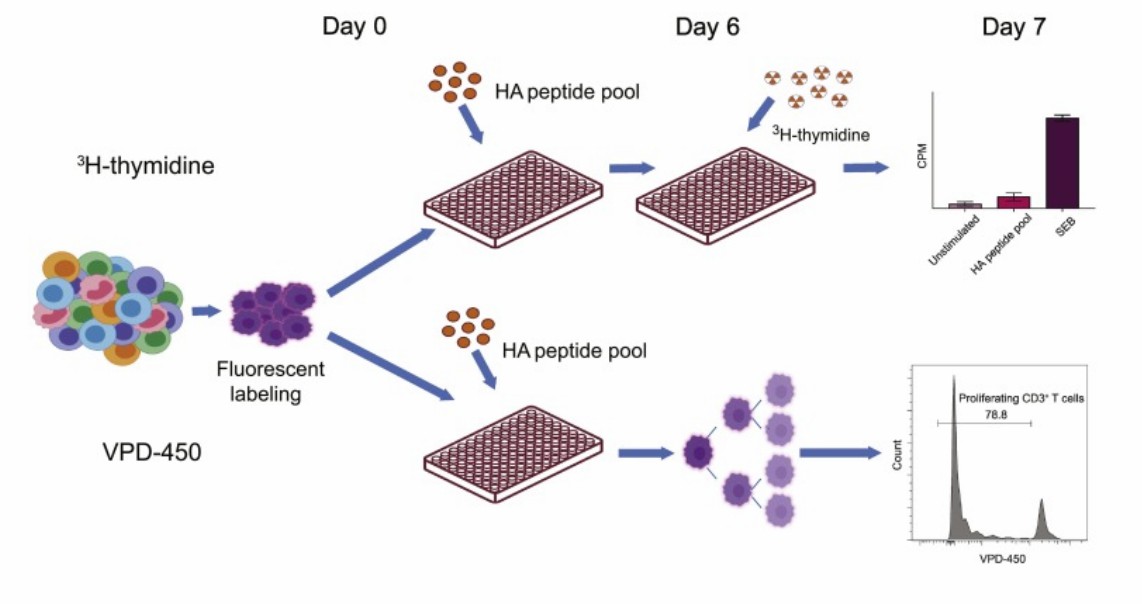T Cell-based 3H-thymidine Assay
Screening cancer epitopes, particularly neoepitope antigens, has become increasingly important in drug discovery and immunotherapy in recent years. Creative Biolabs provides various T and B cell-based epitope analysis assays, including T cell-based 3H-thymidine assay, to analyze cancer pathogenic epitopes.
Cancer Epitope and T Cell-based 3H-thymidine Assay
Cancer antigen epitopes are specific molecules that target T and B cell receptors and induce complex immune responses. Cancer epitopes are typically derived from somatic mutations that cause tumorigenesis and may progress to various diseases and cancer. T cell proliferation analysis is a reliable and reproducible method to determine the presence and frequency of epitope-specific T cells. The use of a 3H-thymidine incorporation assay to investigate T cell proliferative response is a validated tool to screen and test cancer pathogenic epitopes.
 Fig.1 Schematic representation of 3H-thymidine assay.1
Fig.1 Schematic representation of 3H-thymidine assay.1
3H-thymidine Assay-Based Epitope Analysis Services at Creative Biolabs
Creative Biolabs has developed a robust T cell assay platform to provide reliable 3H-thymidine assay to our clients worldwide. Based on your objectives, our experts will design scientific experiments and conduct high-quality studies to support your research.
Workflow of Mouse Model-based Cancer Epitope Discovery Using 3H-thymidine Assay
 Fig.2 The workflow of T cell-based 3H-thymidine assay. (Creative Biolabs)
Fig.2 The workflow of T cell-based 3H-thymidine assay. (Creative Biolabs)
Induce Epitope-specific T Cell Response
T cell proliferation detects antigen-responsive T cells generated from in vitro and in vivo models.
In Vitro Model
-
PBMCs as immune cells to mimick the in vivo environment and factors;
-
Dendritic cells as antigen presentation cells to induce cell immune activation.
In Vivo Model
-
Mouse models are immunized with antigens or peptides;
-
T lymphocytes are collected from mouse lymph nodes for analysis.
T Cell Proliferation Analysis
-
T cells cultures are incubated with 3H-thymidine for several hours to days.
-
As a result, dividing cells incorporated the 3H-labeled thymidine into the replicated DNA strand during the co-culturing period.
-
Afterward, the radioactive is measured using a scintillation counter.
Data Interpretation
The data interpretation is a necessary aspect of the assay. We have established standardized protocols to identify a cut-off value to distinguish positive results from negative ones.
 Fig.3 Cell proliferation to human thyroglobulin peptides.2
Fig.3 Cell proliferation to human thyroglobulin peptides.2
Highlights of Our T Cell-based 3H-thymidine Assay
-
Simple and easy to perform
-
Relatively high throughput
-
Test large numbers of antigens/peptides
Creative Biolabs is a professional provider of bioassays. Our years of program development services provided us with a wealth of experience, allowing us to collaborate closely with our clients to provide T cell assays, including design and operation. Our assay provides clients with consistent and reproducible results. Please feel free to contact us us to get more information.
References
-
Di Blasi, D.; et al. Guidelines for low-frequency antigen-specific T cell results analysis: Dye-based proliferation assay vs 3H-thymidine incorporation. Journal of immunological methods. 2020, 487: 112907.
-
Flynn, J. C.; et al. Pathogenic human thyroglobulin peptides in HLA-DR3 transgenic mouse model of autoimmune thyroiditis. Cellular immunology. 2004, 229(2): 79–85.
For Research Use Only | Not For Clinical Use


 Fig.1 Schematic representation of 3H-thymidine assay.1
Fig.1 Schematic representation of 3H-thymidine assay.1
 Fig.2 The workflow of T cell-based 3H-thymidine assay. (Creative Biolabs)
Fig.2 The workflow of T cell-based 3H-thymidine assay. (Creative Biolabs)
 Fig.3 Cell proliferation to human thyroglobulin peptides.2
Fig.3 Cell proliferation to human thyroglobulin peptides.2
 Download our brochure
Download our brochure